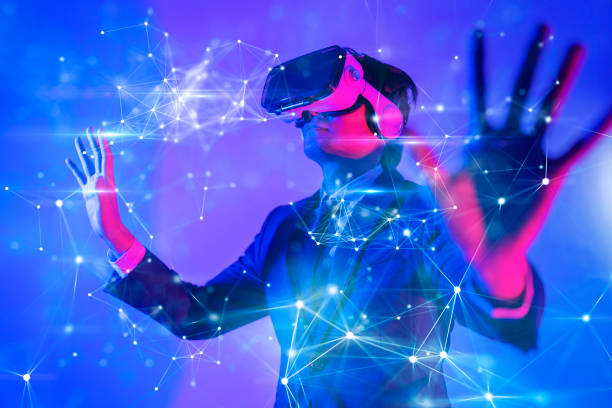Impacts of Metaverse On Education Sector
The education sector has changed dramatically during the last few decades. To keep up with the quickly changing technology landscape, educators have updated their teaching methods, transitioning from oral explanations and blackboard drawings/sketches to digital smart classrooms.
Today’s teaching approaches are primarily focused on student learning, with an emphasis on establishing an engaging and immersive atmosphere in which students can learn concepts more effectively. With online learning becoming more common, particularly in the aftermath of the pandemic, the education sector is now primarily focused on incorporating immersive technologies into academic courses to make learning more entertaining and engaging.
The metaverse development is one such topic for educators all across the world. It seeks to immerse students in an immersive experience in which they can participate in interesting activities that make learning more enjoyable. Gone are the days when pupils created textbook scenarios based on teacher explanations.
Today, we live in a digitally connected society where notions like metaverse materialise themselves in real-world applications. In such a scenario, it’s easy to foresee the transformative effects that this network of virtual worlds known as the metaverse can have on the global education system. In this insight, we will look deeply into the relationship between the metaverse and the education system, and how the latter uses the metaverse’s power.
What exactly is the metaverse?
The metaverse is a three-dimensional virtual world that combines elements of online gaming, social networking, virtual reality (VR), and augmented reality (AR) to create a virtual environment in which users can interact. It is a persistent, always-on, real-time ecosystem that overcomes geographical borders to provide meaningful services to users.
This vast virtual environment might provide you with services that are not available in the actual world. It provides a location for gaming, socialising, entertainment, learning, working, and a variety of commercial options.
Applications of the Metaverse in Education
The education industry can benefit from the metaverse in various ways, including:
3D Virtual Classrooms
With the rise of online schools and universities, students have began to notice a disparity between immersive physical classrooms and virtual classrooms. The metaverse can bridge this divide by allowing students to digitally meet and interact with their classmates and teachers in 3D virtual classrooms. Students from any geographical place can participate in this metaverse-powered learning environment and go much beyond what a conventional classroom can offer.
Digital Education
When smart courses were introduced into school curriculum, they improved students’ learning by projecting video on numerous academic themes. The metaverse tries to improve these classes by allowing students to fully immerse themselves in such movies, allowing them to experience all of the content more closely. Furthermore, it allows people to try, fail, and learn from their mistakes in subjects that require real experiments. Even traditional classrooms can benefit from 3D virtual learning to achieve desired learning outcomes.
Campus Activities on The Internet
Students can participate in extracurricular activities like as athletics and arts in a virtual setting thanks to the metaverse. Students can participate in interesting activities such as music or math clubs, which are equivalent to physical campus activities. They can even tour their virtual campus from the comfort of their own home.
Interdisciplinary Education
The metaverse has the potential to break down subject borders and encourage interdisciplinary learning. It enables teachers to combine traditionally separate disciplines such as mathematics and physics, providing an engaging and holistic learning experience while demonstrating the real-life applications of many theories.
Learning in the metaverse is beneficial because it engages students by simulating real-life circumstances in which they can conduct scientific experiments, demonstrate prototypes, and even enter a documentary video, such as one about World War I. Subject-specific 3D spaces may be produced in the future to aid students’ learning while also assisting professors in better explaining subject knowledge.
Raising Awareness
To arouse children’s humanitarian interests, the metaverse can be utilised in classrooms to raise awareness of societal issues such as famine, pollution, and climate change. Students, for example, could be shown a documentary about famine in Somalia or poverty in Burundi to better understand how it impacts the people who live there. Students will take home not only theoretical knowledge but also a profound emotional sense of what is going on around them if such a teaching technique is used.
Tours Via Virtual Reality
Consider reading about a country or location in class and then immediately visiting to that location. Wouldn’t it be an incredible experience? Although such possibilities are not possible in the real world, the metaverse allows for them by providing virtual world tours. The metaverse helps students expand their horizons and enhance their worldviews by allowing them to travel to any location of their choice in a virtual setting within minutes.
People and Events
Educators might invite notable figures or people of wisdom and knowledge from the virtual realm of the metaverse to share their life experiences with students. They can participate in interesting symposiums, conferences, and lectures. Various events, such as exhibitions and festivals, can also be held to assist them rejuvenate their thoughts.
How do various subjects make use of the metaverse?
History – Any historical era can be replicated in a metaverse, where students can study about it in an immersive environment. For example, students can see the French Revolution as if it were real.
Geography and Astronomy – Students in Geography and Astronomy can explore the solar system, different levels of the earth, and constellations using the hyper-realistic visual experience provided by a metaverse.
Science – The Metaverse simplifies laboratory procedures by allowing students to experiment in a virtual environment. They can, for example, dissect a virtual cockroach to learn about insect anatomy or do experiments on Newton’s weight, mass, and gravity, among other essential ideas.
Art – Within the metaverse, students can thoroughly examine works by famous painters and be inspired to create their own digital artwork.
Literature – A novel or a story can be replicated in a metaverse where students can enter and watch the scenes unfold, allowing them to better grasp the plot and empathise to the characters.
Endnote: The Metaverse’s Role in Education
Since Facebook was rebranded as Meta, the phrase metaverse has garnered a lot of attention. It has piqued the interest of major brands and corporations, which have already begun to invest in various metaverse projects. Although the concept of the metaverse is making inroads into academia, its full potential in the education sector has yet to be realised. Meta is investing $150 million in Meta Immersive Learning to expand students’ access to learning through technology, and other businesses and renowned colleges are exploring the possibilities of metaverse education. The metaverse will surely remodel the education system, expedite learning, and reconstruct the existing system into a more advanced, innovative, and relevant one due to its numerous benefits.
We are happy to discuss your project needs if you are wanting to construct or improve a metaverse virtual world. Please contact RisingMax metaverse consulting service provider experts.




